Haz clic aquí para leer en español
The ‘Herstory: She Can’ series profiles women who pursue their passions. Each have stepped up with courage, a message, and a willingness to share her own odyssey. This retelling is based on annotations of conversations with Carol Jones, of Bariloche, Argentina. If interested in taking a horseback ride with her, visit the website.
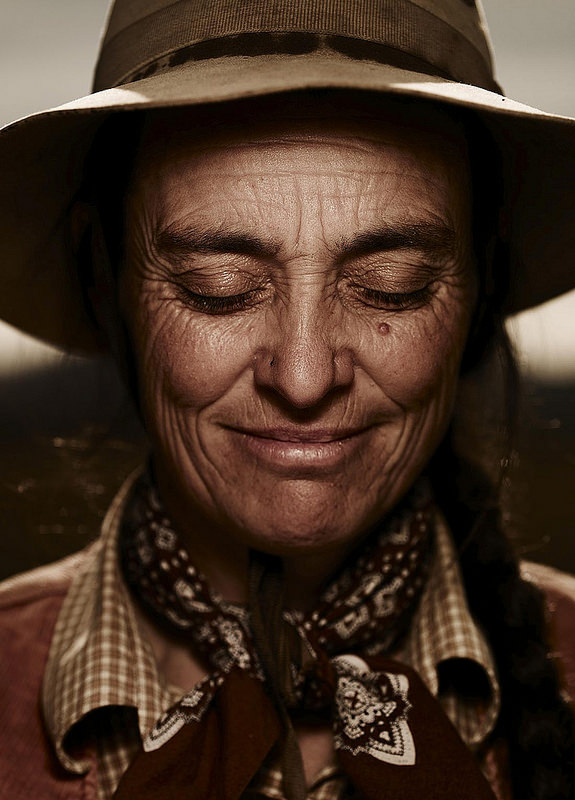
When asked what his boss, Carol, can do, Luca, the estancia gaucho suggested, “ella te puede brindar el mejor dia de tu vida.” [She can offer you the best day of your life]. He went on to describe their most recent summer of cabalgatas, horseback tours for visitors, saying, “All summer, every day was a Sunday.”
Carol is what folks around here would call a “NiC.”
Nacido i Crecido. Born and raised in Bariloche.
While this in and of itself is a unique claim to fame, as with most beautiful tourist towns many residents are imports; in fact, her roots run deeper even than that. In our first conversation, she likened herself to the hardy bushes and shrubs of the land she loves. “I enjoy traveling but when I come back I know I belong here, to this earth.”
Her grandfather, Jarred Jones, was the first pioneer extranjero to establish himself in this area in the time of Butch Cassidy and the Sundance Kid, to whom he played host when they rolled through. In a 2009 Interview on her website she shares, “My family’s history has helped me because we have a good reputation throughout the entire area. Specifically my grandfather, and father, as well. My grandfather was always very good with horses. He was a super cowboy! He and my father were very nice, respectful and considerate people.”
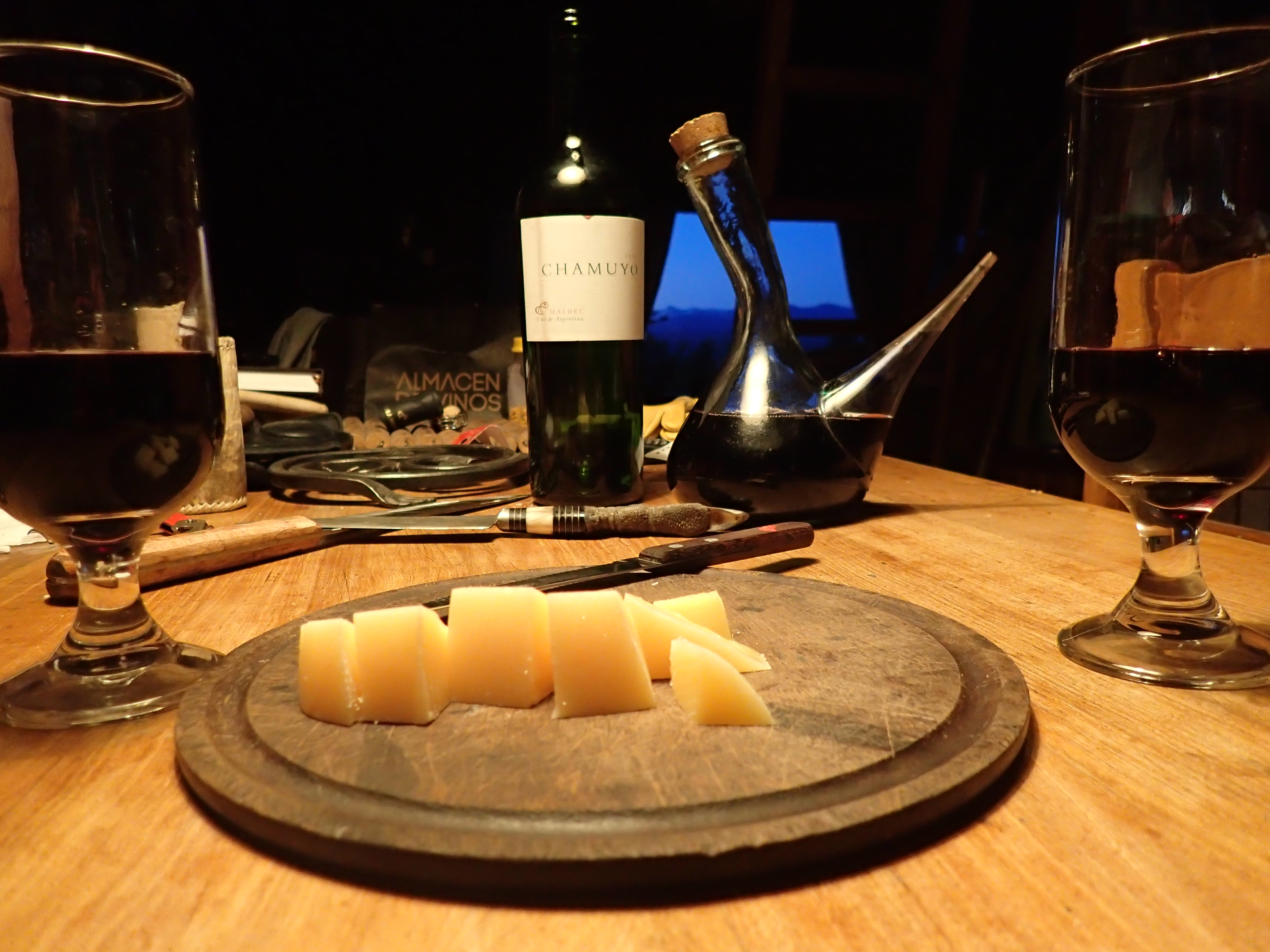
Carol knows the culture and people as well as she knows the land. As our understanding and appreciation of mate deepens, she teaches us the general delineations of who likes their mate how. Elders tend to like it llullo, while the gauchos like it amargo (bitter). As the evening stretches on talk wanders to local legend and lore, as I continue to collect them for the telling.
We talk about la luz mala, of local lore. “Hay muchas creencias like that here,” she goes on to share a number of hair raising local tales. Her telling transports us fireside, stars overhead, horses nickering in the background. Carol’s perseverance and experience begot wisdom, which she ties back to her relationship with horses.
“I am the same with horses and kids, I try not to influence them but to let them be free. It seems they turn out the same, happy and good but also spoiled.” She laughs. She laughs a lot.
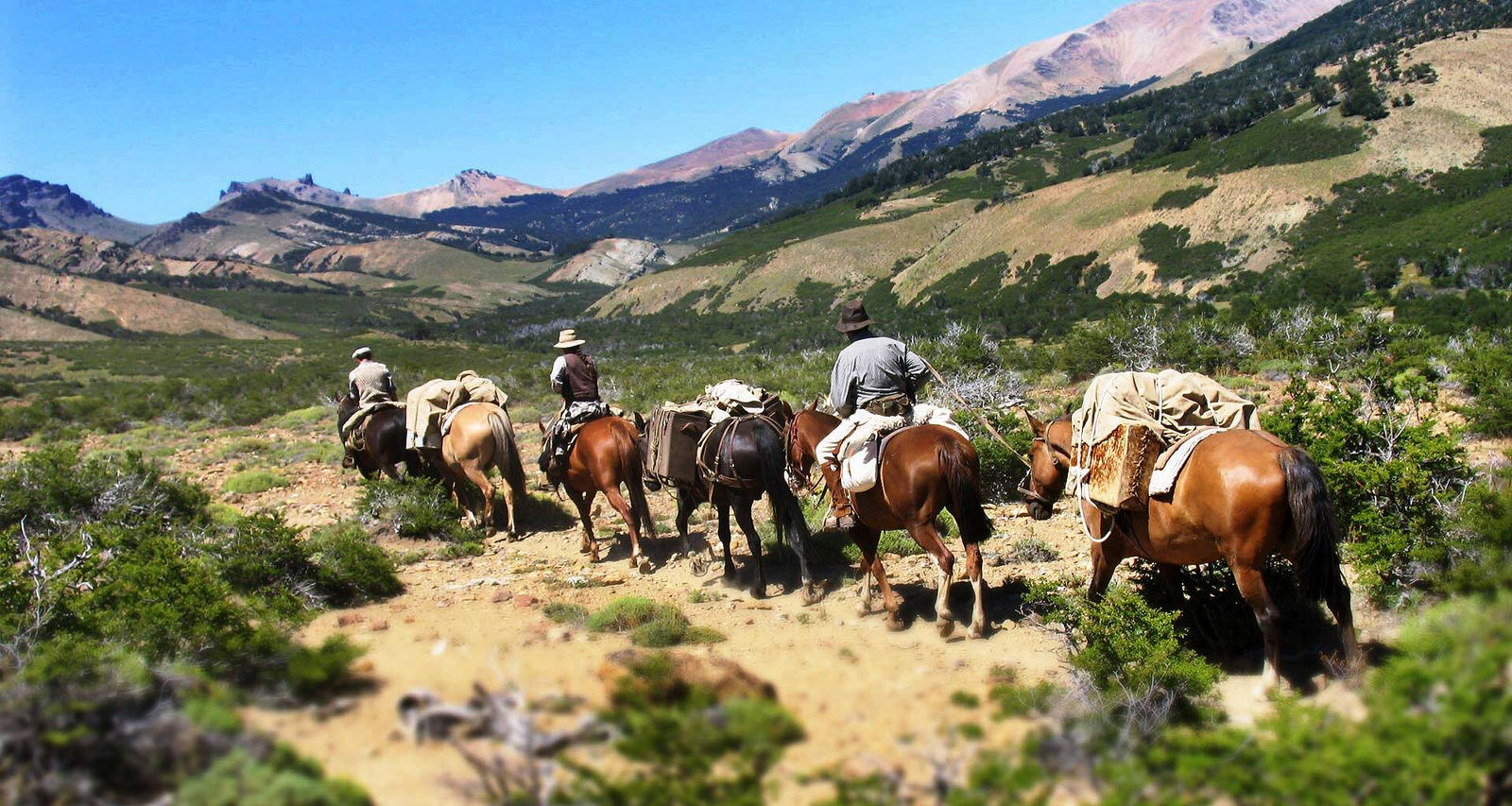
In the interview mentioned above, when asked, “What is your favorite part about working with horses?” she replied:
I like to be with them, to saddle them, to move with them. And when I ride, to study them — how they choose trails, how they go on difficult trails, when they hear something what they do, there is always lots of things to learn from them. They are always right. If something wrong happens it is due to humans making the wrong choice and not being observant of what the horse is telling us, always.
In our own conversations she ties this to a larger philosophy. “Hay que observar, mirar, estudiar el caballo” (You have to observe, watch, study the horse), is also a lesson she taught her children about traveling, “go everywhere and do everything but you must be alert, cada uno se cuida solo” (everyone is responsible for themselves).
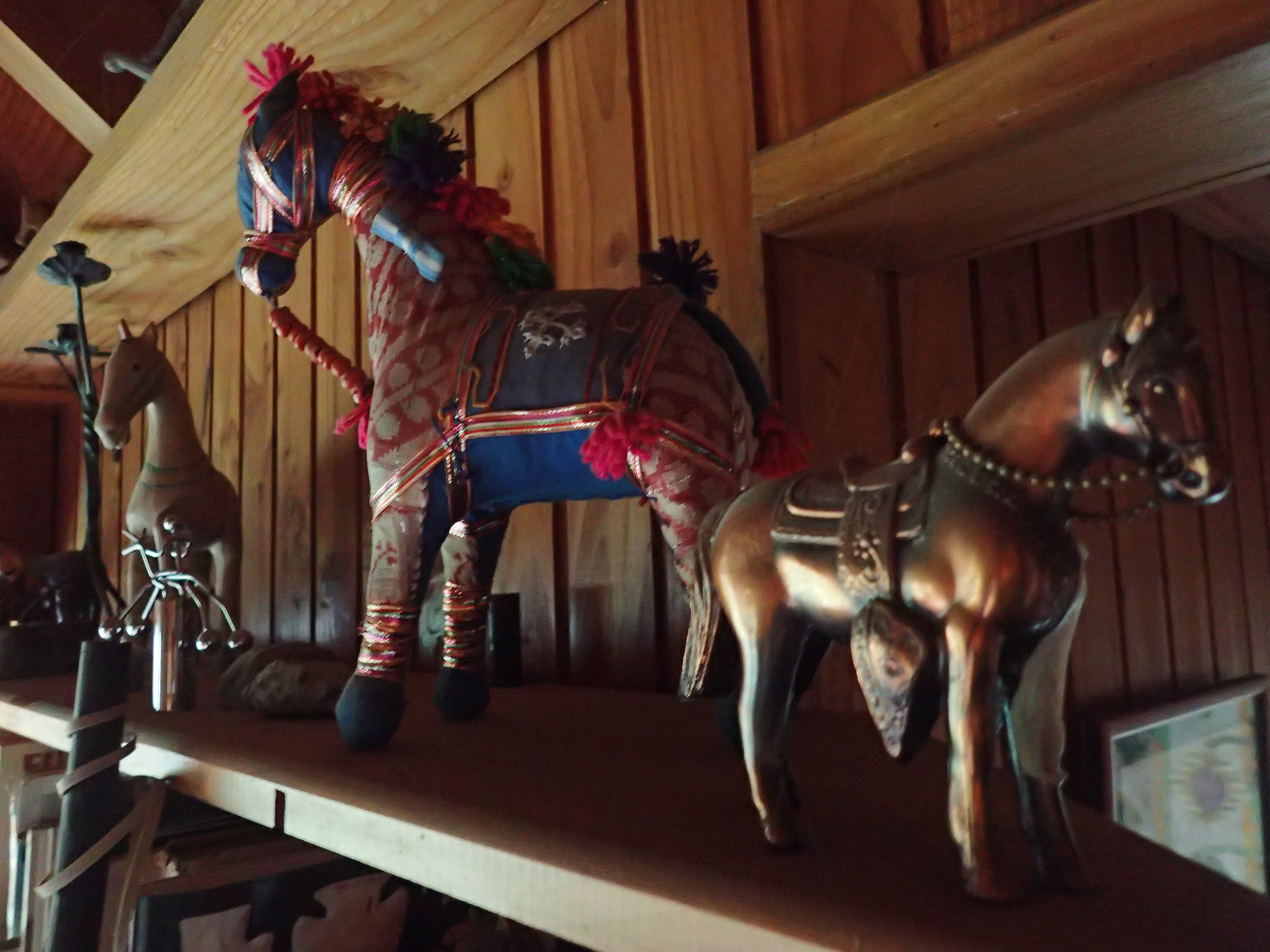
This lesson of being observant, one her children and employees know she will always harp on, she practices herself. One example is her horse collections. While her home hosts her figurines from around the world, “at the ranch I have made a ceramic figurine of every horse I’ve ever had. I have probably over 50 now.”
She has always loved horses and working with them. When she approached her parents about the idea to begin running a cabalgata business, her father did not think this was a woman’s work, but figuring she would tire of it after a season, he loaned her 6 horses. “I borrowed 6 saddles from a friend,” and that was the beginning of her business.
She cites a 1986 trip to Wyoming as a source of inspiration. “There I saw a lot of women doing ranch work and I thought, ‘wow, I like it.’ Back then there were not women doing this sort of thing. The idea of the cabalgatas for visitors was not a known idea. When I started I would go for 6 or 8 days with just one person.” Now, 20 years later, she runs a business with clients from all across the globe, and local cowboys are still surprised when they learn she is still in the business.
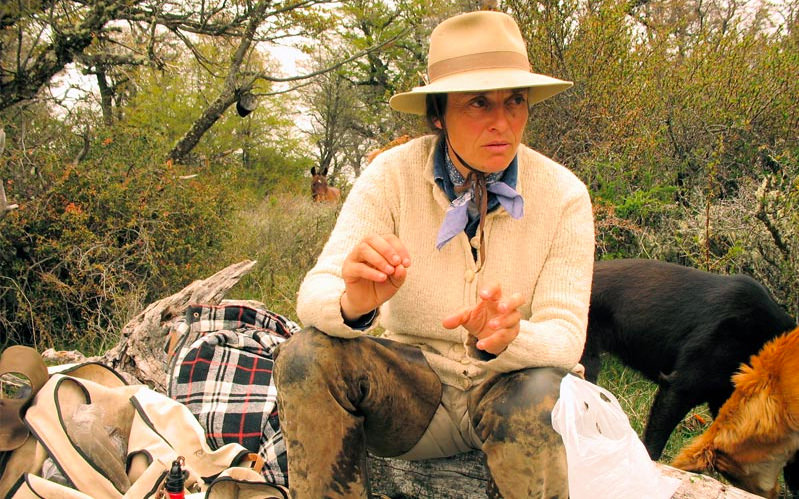
Traducción por Henry Tovar
La serie ‘Herstory: She Can’ perfila a las mujeres que persiguen sus pasiones. Cada uno ha intensificado con coraje, un mensaje y una voluntad de compartir su propia odisea. Este recuento se basa en anotaciones de conversaciones con Carol Jones, de Bariloche, Argentina. Si está interesado en tomar un paseo a caballo con ella, visite el sitio web.

Cuando se le preguntó lo que su jefe, Carol, puede hacer, Luca, la estancia del gaucho sugirió, “ella te puede brindar el mejor dia de tu vida”. Continuó describiendo su verano más reciente de cabalgatas, excursiones a caballo para los visitantes, diciendo: “Todo el verano, todos los días era un domingo”.
Carol es lo que la gente de aquí llamaría un “NiC”.
Nacido y Crecido.
Mientras que esto en sí mismo es una reivindicación única a la fama, como con la mayoría de las ciudades turísticas hermosas muchos residentes son importaciones; De hecho, sus raíces son más profundas que eso. En nuestra primera conversación, se comparó con los arbustos robustos y los arbustos de la tierra que ama. “Me gusta viajar, pero cuando regreso sé que pertenezco aquí, a esta tierra”.
Su abuelo, Jarred Jones, fue el primer pionero extranjero en establecerse en esta área en la época de Butch Cassidy y Sundance Kid, a quien fue anfitrión cuando pasaron. En una entrevista de 2009 en su sitio web, ella comparte: “La historia de mi familia me ha ayudado porque tenemos una buena reputación en toda la zona, específicamente mi abuelo y mi padre, mi abuelo siempre fue muy bueno con los caballos. Super cowboy! Él y mi padre eran muy amables, respetuosos y considerados. ”

Carol conoce la cultura y la gente así como ella conoce la tierra. A medida que nuestra comprensión y aprecio de la pareja se profundiza, ella nos enseña las delineaciones generales de quién le gusta a su pareja cómo. Los ancianos tienden a gustarle llullo, mientras que los gauchos les gusta amargo (amargo). A medida que la noche se extiende en la charla vaga a la leyenda local y la sabiduría, como yo continúo recogiéndolos para la narración.
Hablamos de la luz mala, de la sabiduría local. “Hay muchas creencias como ésta aquí”, continúa compartiendo una serie de cuentos locales. Su dicho nos transporta a la hoguera, las estrellas por encima de nosotros, los caballos pellizcando en el fondo. La perseverancia y la experiencia de Carol engendraron la sabiduría, que ella ata a su relación con los caballos.
“Yo soy el mismo con los caballos y los niños, trato de no influir en ellos, pero para que sean libres. Parece que resultan lo mismo, feliz y bueno, pero también mimado.” Ella ríe. Ella se ríe mucho.

En la entrevista mencionada anteriormente, cuando se le preguntó: “¿Cuál es tu parte favorita de trabajar con caballos?” ella respondió:
Me gusta estar con ellos, ensillarlos, moverme con ellos. Y cuando viajo, para estudiarlos – cómo eligen los senderos, cómo van en senderos difíciles, cuando escuchan algo de lo que hacen, siempre hay muchas cosas que aprender de ellos. Siempre tienen razón. Si sucede algo malo es debido a que los seres humanos hacen la elección equivocada y no son observantes de lo que el caballo nos está diciendo, siempre.
En nuestras propias conversaciones lo vincula a una filosofía más amplia. “Hay que observar, mirar, estudiar el caballo”, es también una lección que enseñó a sus hijos sobre el viaje, “ir a todas partes y hacer todo, pero usted debe estar alerta, cada uno se Cuida solo “(todo el mundo es responsable de sí mismos).

Esta lección de ser observadora, uno de sus hijos y empleados saben que ella siempre se engancha, ella se practica. Un ejemplo son sus colecciones de caballos. Mientras que su casa alberga sus figuritas de todo el mundo, “en el rancho he hecho una estatuilla de cerámica de cada caballo que he tenido. Tengo probablemente más de 50 ahora.”
Siempre ha amado los caballos y ha trabajado con ellos. Cuando ella se acercó a sus padres sobre la idea de comenzar a dirigir un negocio de cabalgata, su padre no pensó que esto era una obra de mujer, pero calculando que se cansaría de ella después de una temporada, le prestó sus 6 caballos. “Le pedí prestada 6 sillas de montar a un amigo”, y ese fue el comienzo de su negocio.
Ella cita un viaje de 1986 a Wyoming como fuente de inspiración. “Allí vi a muchas mujeres haciendo trabajo de rancho y pensé, ‘wow, me gusta’. En aquel entonces no había mujeres haciendo este tipo de cosas, la idea de las cabalgatas para los visitantes no era una idea conocida, cuando empecé a ir por 6 o 8 días con una sola persona “. Ahora, 20 años más tarde, dirige un negocio con clientes de todo el mundo, y los vaqueros locales siguen sorprendidos cuando se enteran de que todavía está en el negocio.

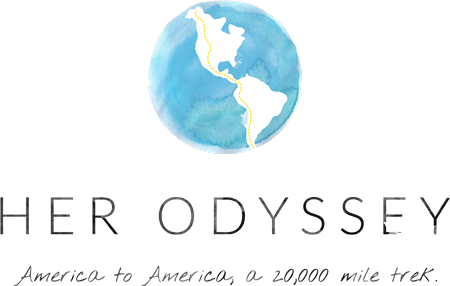

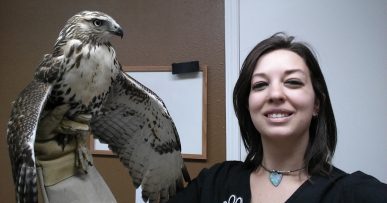
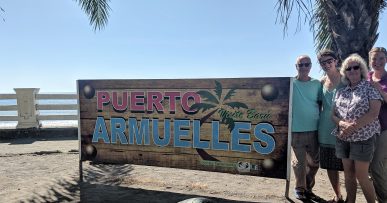


Comments (5)
Thanks for this interesting story of horses and lady horse riders.
You share such good stories.
The close up portrait photo of Carol is incredible. Thanks for sharing her story.
It sure is! We can’t take credit for it, though. That photo came from Carol’s personal collection.
Just a minor correction to an otherwise excellent article on Carol Jones, you wrote:
“When asked what his boss, Carol, can do, Luca, the estancia gaucho suggested, “ella te puede brindar el mejor dia de tu vida.” [She can toast you the best day of your life].”
In this context the verb “brindar” has nothing to do with drinking, so it would best be translated as:
“She can offer you the best day of your life.”
Thanks, Anthony. I’ll get back with the translator. Best Regards, Emily Briggs.